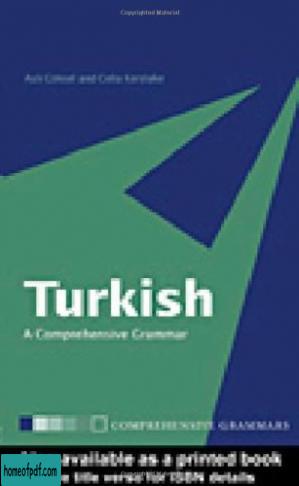Turkish: A Comprehensive Grammar (Comprehensive Grammars)
该资源由用户: 珉林庆波 上传 举报不良内容

尊敬的读者:
欢迎您访问我们的网站。本站的初衷是为大家提供一个共享学习资料、交换知识的平台。每位用户都可以将文件上传至网盘并分享。
然而,随着用户上传的资料增多,我们发现部分不宜或版权问题的书籍被分享到了本站。
为此,我们已经关闭了分享入口,并进行了多次书籍审查,但仍有部分内容未能彻底审查到位。
在此,我们恳请广大读者与我们共同监督,如发现任何不宜内容,请 点击此处 进行举报,我们会第一时间处理并下架相关内容。
希望我们能共建一个文明社区!感谢您的理解与支持!
猜你喜欢

《人间椅子》江户川乱步
View more
《人间椅子》江户川乱步

Postgre SQL 7 数据库开发指南 - 许宏松
View more
Postgre SQL 7 数据库开发指南 - 许宏松

《解码日本文化DNA:妖怪、绘画与文学(共9册)入夜识+浮世绘百景+神兽引领的使命+痴人之爱+如父如子+告白+山茶文具店+人间便利店+跷跷板妖怪》
View more
《解码日本文化DNA:妖怪、绘画与文学(共9册)入夜识+浮世绘百景+神兽引领的使命+痴人之爱+如父如子+告白+山茶文具店+人间便利店+跷跷板妖怪》

《能断:金刚经给你强大》索达吉堪布珍藏版
View more
《能断:金刚经给你强大》索达吉堪布珍藏版

Flex 4 in Action - Tariq Ahmed, Dan Orlando with John C. Bland II and Joel Hooks
View more
Flex 4 in Action - Tariq Ahmed, Dan Orlando with John C. Bland II and Joel Hooks

微服务架构与实践 - 王磊
View more
微服务架构与实践 - 王磊

《穿过迷雾》任俊杰文字版
View more
《穿过迷雾》任俊杰文字版

《西出玉门》尾鱼
View more
《西出玉门》尾鱼

《记忆宫殿》宁梓亦
View more
《记忆宫殿》宁梓亦

《我不喜欢这世界,我只喜欢你》乔一
View more
《我不喜欢这世界,我只喜欢你》乔一

《安妮宝贝经典作品:八月未央+彼岸花+告别薇安+莲花+春宴+素年锦时(共6册)》安妮宝贝珍藏版
View more
《安妮宝贝经典作品:八月未央+彼岸花+告别薇安+莲花+春宴+素年锦时(共6册)》安妮宝贝珍藏版

《和电风扇一起摇头》大岛
View more
《和电风扇一起摇头》大岛


